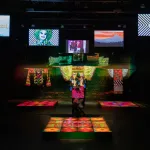
The ancient city of Pompeii, it seems, has taken a liking to the recently implemented “day tripper” tax in Venice, or at least the theory behind it, and will soon put in place restrictions on the number of visitors allowed to visit the well-preserved city per day.
Unlike Venice, which has seen “mixed results” with its new €5 day pass, Pompeii will simply cap the number of people that can visit the site in a day at 20,000. The new policy begins November 15.
The ideal outcomes are, however, the same. Gabriel Zuchtriegel, the director general of the archaeological park in Pompeii told ABC News that “the goal of a new daily cap is to help slow the continued surge in foot traffic” which would help facilitate long term conservation efforts and limit the amount of foot traffic.
“We are working on a series of projects to lift the human pressure on the site, which could pose risks both for visitors and the heritage [that is] so unique and fragile,” Zuchtriegel said.
More than 36,000 people visited Pompeii in a single day in October, authorities reported. This summer, 4 million people walked through the ruins on Pompeii, which in 79 CE was destroyed by the eruption of Mount Vesuvius.
A UNESCO World Heritage Site, Pompeii recently served as the inspiration for Alison Katz’s multi-artist exhibition “In the House of the Trembling Eye” at the Aspen Art Museum. The show included works from private collections in and around Aspen, Katz’s own work, and ancient Pompeian fresco fragments that for the first time were juxtaposed with contemporary work by artists such as Lucio Fontana, Jeffrey Gibson, Ellsworth Kelly, Kerry James Marshall, Julie Mehretu, Joan Mitchell, Elizabeth Peyton, and Alice Neel.


